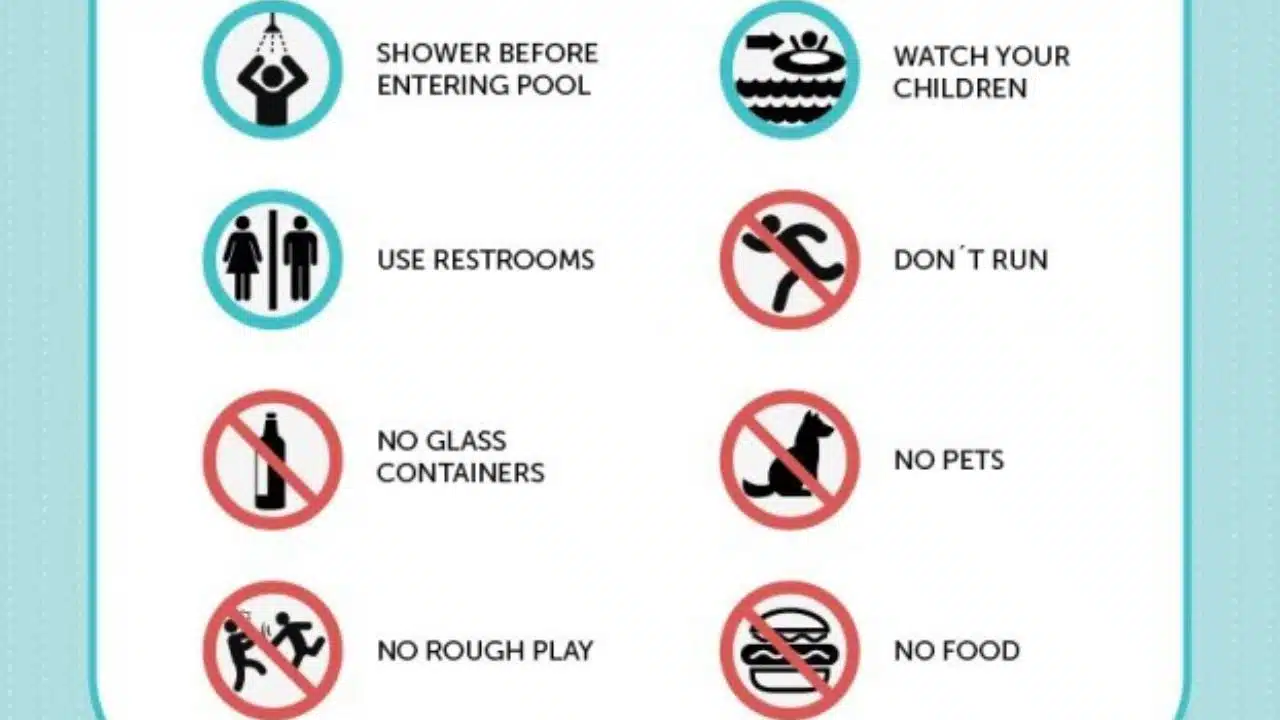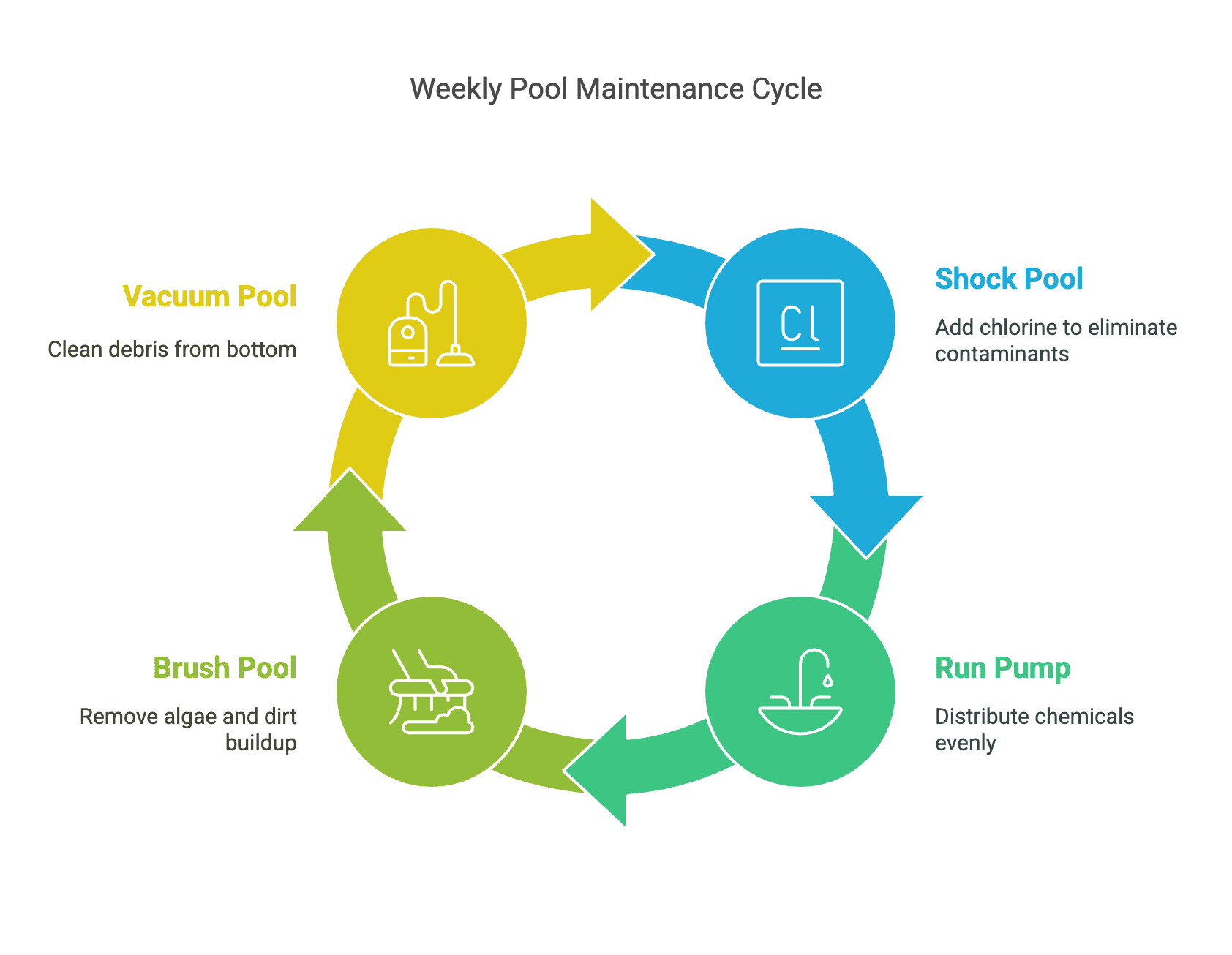Having a swimming pool in your own backyard can provide endless fun for families and friends. During the warmer months, a pool can significantly enhance your comfort as it provides a convenient way for everyone to keep cool. If you have children, it could serve as a substitute for a pool club membership or summer camp, thereby saving you money. Moreover, a well-maintained pool can boost your home’s resale value and make it more attractive to buyers, potentially facilitating a quicker sale should you decide to sell.
Ultimately, a swimming pool can be considered as an investment in your personal happiness and lifestyle for as long as you reside in your home, creating a private oasis where you and your loved ones can build lasting memories. However, this oasis can give you a lot of headaches if not properly cared for, which is why keeping your swimming pool in pristine condition is a must.
Daily Maintenance Tasks
One of the simplest yet most important tasks in pool maintenance is skimming the surface of your pool daily. For this, you need to use a long-handled net or skimmer that can efficiently remove debris such as leaves, insects, and other unwanted particles. Doing so not only keeps your pool looking clean but also prevents debris from sinking to the bottom, which can make the cleaning process more challenging down the line.
The skimmer basket plays a vital role in your pool’s filtration system by filtering out debris from the water and ensuring proper circulation. That’s why it’s essential to make a habit of emptying it daily, as this can prevent clogged filters and support the efficient functioning of your pool’s filtration system, thus providing you with clear and clean water to enjoy.
For your pool’s overall functionality, it’s also essential to maintain the correct water level, typically at the midpoint of the skimmer opening. If the water level is too low, the pump might run dry and risk significant damage, but if it’s too high, the skimmer won’t operate as intended, compromising the cleaning process. As such, it’s best to check the water level daily and add or remove water as necessary in order to ensure the optimal performance and longevity of your pool equipment.
Weekly Maintenance Tasks
Your pool water needs to have the right chemical balance for it to stay clean and safe to use. To achieve this, you must regularly test the water chemistry, at least once a week, using a reliable pool test kit and monitor several key parameters such as the pH level, alkalinity, chlorine, calcium hardness, and cyanuric acid, often known as a stabilizer. Balancing these chemicals will help you avoid common pool issues such as algae growth, cloudy water, and skin irritation.
Another critical aspect of pool maintenance is shocking the pool, which involves adding a large dose of chlorine or other pool shock chemicals to eliminate bacteria, algae, and other contaminants, ideally once a week and preferably in the evening when the pool is not in use. Make sure to follow the manufacturer’s instructions for the appropriate dosage, and remember to run the pool pump for several hours after adding the shock to ensure proper distribution throughout the water.
Regular brushing of the walls, floor, and steps of your pool is also necessary to remove algae, dirt, and other buildup that could cause staining and health hazards. Note that some areas tend to have poor circulation, such as corners and steps, where algae are more likely to grow, and pay more attention to these when cleaning. You should also vacuum your pool once a week to remove any dirt and debris that may have settled at the bottom and don’t forget to cover the entire pool floor and walls for a thorough cleaning.
Monthly Maintenance Tasks
Your pool’s filter plays a vital role in removing small particles and debris, ensuring that the water remains sparkling clean, but the cleaning procedures will differ accordingly depending on the type of filter you have. Generally, it is advisable to clean your pool filter every month, though this can vary based on the manufacturer’s recommendations and your specific usage.
It’s also important to regularly inspect your pool for signs of leaks, as doing so helps protect the overall health of your pool and its surrounding area. “Pool leaks can be caused by a variety of factors, including improper pool winterization or typical pool wear and tear over time,” says Ryan West, owner of Leak Science.
A quick way to do this is to look for wet spots around the pool’s perimeter, listen for the sound of running water when all equipment is turned off, and closely monitor the water levels. A sudden and unexplained drop in the water level can be a clear indication that a leak is present. Once you suspect a leak, immediately contact a professional who can perform a thorough inspection and provide the necessary repairs to prevent further damage.
Lastly, remember to inspect your pool equipment regularly, including the pump, heater, filter, and any other operational components of your pool system. Pay attention to any unusual noises or signs of visible damage and ensure that everything is running smoothly. If you can spot potential issues early on, you can catch small problems before they escalate into major issues, thus preventing costly repairs and extending the lifespan of your pool equipment.









































